Every Taylor Swift album, ranked
- Oops!Something went wrong.Please try again later.
Entertainment Weekly looks back on the tour de force singer's many milestones, re-recordings, and eras.
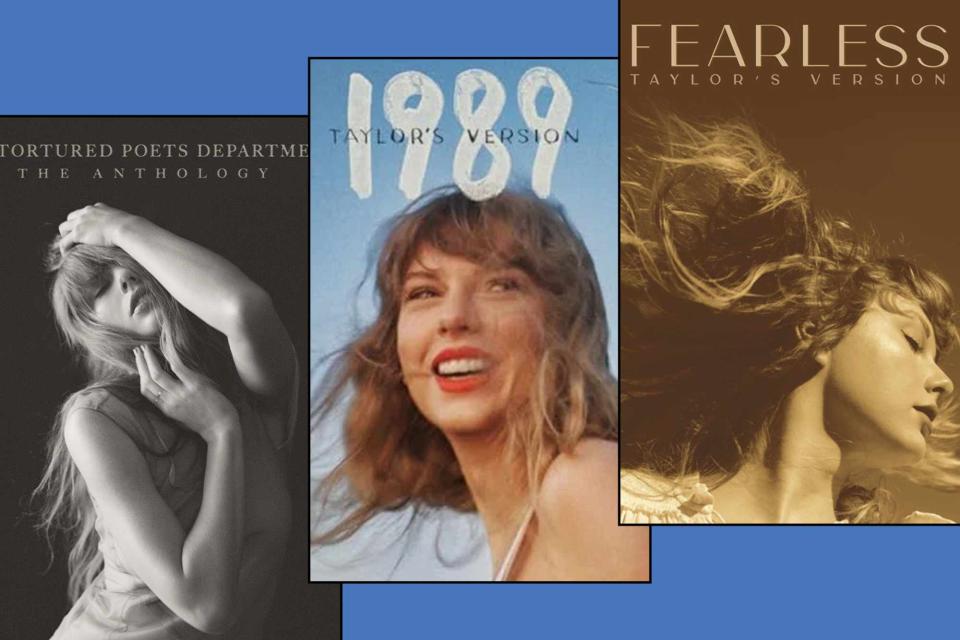
Universal Music Group (3)
Let's be clear: There are no bad Taylor Swift albums. Since arriving to (and soon conquering) the popular music scene 18 years ago, the breadth and depth of her work has spanned multiple genres and broken industry records at almost every turn.
The singer's latest milestone came via 2024's The Tortured Poets Department, a double album anthology that shattered music streaming records, topped Billboard charts, and surpassed all her previous LPs' sales almost immediately.
The difficulty (and, perhaps, the beauty) of attempting to order her discography is that whichever albums harbor your affections most can change by the year, month, day, and even hour depending on your headspace and heartache. She's an artist defined by eras (see: the highest-grossing tour in history) — a Reputation era for self-defense, a Lover era for romantic solace — which her adoring fans latch onto and assign to their own life stages with fervor.
Almost every emotion has been articulated by Swift at some point, whether in broad-stroke breakup anthems or close-to-the-chest confessionals. She's endlessly accessible, easy to understand even in her later, more cryptic works, yet her songwriting is also a blank space (*cue pen-click*) ripe for filling in your personal memories and private associations.
So, though this list must pick favorites, it's also a love letter to her illustrious career and its intersections into listeners' lives. Now, without further ado, here's EW's ranking of every Taylor Swift album.
11. Taylor Swift (2006)
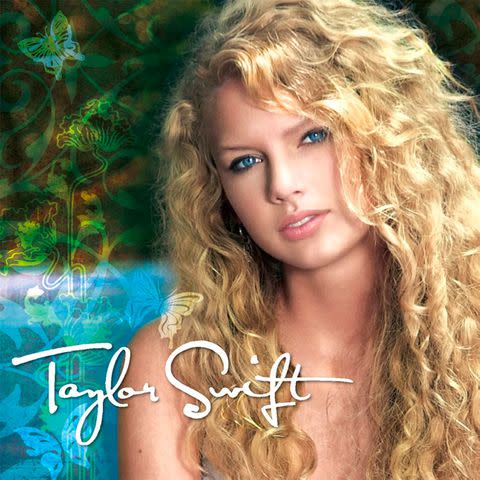
Many artists lucky enough to enjoy their 15 minutes of fame peak at the onset, delivering one or two tokens of pop culture product before a dwindling stream of less impressive ventures. But as we all know, Taylor Swift isn't like other artists. Her self-titled debut stood as her lone and tall titan at the time of its 2006 release, which was immediately met with commercial and critical success, catapulting a then-16-year-old Swift to stardom almost overnight. The catalyst was lead single "Tim McGraw," but this ticket to the country radio airwaves turned out to be a red herring with the advent of other ironclad, infinitely repeatable songs that remain fan favorites, even in lieu of our now excess of options.
Acoustic guitars, violins, and banjos enjoy free reign, dancing across tales of childhood friends destined for sparks, short-lived summer love, and backroad rendezvous. "Picture To Burn" is a scorned teen's "Before He Cheats" — swapping shooting whiskey for rumor mills — with a grown woman's wit and a veteran songwriter's aptitude. "Should've Said No" carries the same torch with a steadier hand, being one of the three songs she penned completely on her own. And, of course, the other notable solo feat is "Our Song," marrying a whimsical fiddle with a full-circle story of a good girl's heart won through small rebellions and romantic gestures: whispering on the phone, sneaking kisses through screen doors.
These were the de facto anthems for young listeners especially, clutching MP3 players to the chest like rosaries as we projected onto Taylor's portraits of then-mythical teen love. "Drew looks at me / I fake a smile so he won't see / that I want and I'm needin' / Everything that we should be" was as good as poetry, and a north star to the forlorning that looms in girlhood.
All necessary praise aside, one of the great joys of tracing Taylor Swift's arc is seeing her sound bleed across genres, from country and pop to (half-baked) hip-hop and folk and back. But her self-titled debut is stagnant in retrospect, its feet firmly planted into an arbitrary industry mogul's limited vision of the "next best country artist." But clearly, Taylor is capable of much more, and her nine subsequent albums are proof. So while it's vehemently impressive that an adolescent was the creative force behind the best tracks on a seven-time platinum record, it doesn't change the fact that it's far from her best work, and mostly made of songs that slip through her legacy's cracks more than any other album. Thus, Taylor Swift is reduced to the last spot on our ranking, partially by default, though also with respect — and not without a good fight.
10. Lover (2019)
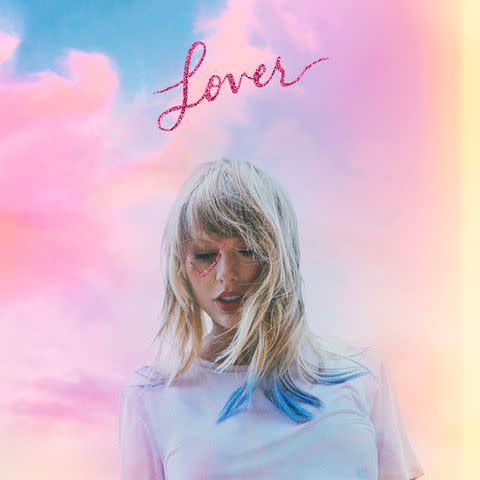
Lover is a backtrack in a way. Where Reputation before it was a risky, abrasive side-step shrouded in a smoky eye, Lover's follow up is a blushing cheek beaming with rosy retrospection and hopes for the future. Perhaps compensating for that previous album's wave of negative press, Taylor here returns to her tried-and-true toolbox, leaning into romantic whim and angelic daydreams: living room waltzes, paper promise rings, sneaking through gardens, skipping down streets. She colors its lyrics and soundscapes between the clear cut, ear candy lines — a hint of bubblegum pop, a dash of animated movie-anthem flair (it's a miracle that "ME!" escaped the fate of Pharrell in Minions or Timberlake in Trolls).
Overall, it's charming and mostly tame, but then again, she's happy. Gone is the will-they-won't-they tension of Reputation's hushed, closed-door affair; Taylor's Lover is here to stay, and this seventh studio album exists almost solely to deliver that proclamation between a few self-love clichés ("I'm the only one of me") and tired girl-power taglines ("If I was a man / Then I'd be the man").
She gets the heavy hitters out of the way early, beginning with a last word in "I Forgot That You Existed," a wink and wave goodbye to social media swarms and energy sucks. She's moved on, but she also wants us to know she's moved on. And the majority of Lover proves her path to better things, being an airy, whipped topping "love letter to love," both for the self and for a partner.
But before expanding on her honeymoon phase, we're treated to the tour-de-force track "Cruel Summer" (not a Bananarama cover), a buzzer-beating, angst-wielding anthem that's among the greatest pop songs her auteur has ever crafted. As if a trump card she saved specially for its bridge, Taylor relinquishes a rare shriek of elation and dismay ("He looks up grinning like a devil!") to ultimate effect (and influence to mega-fan Olivia Rodrigo's raucous debut). But once the title track's idyllic and endearing comedown is over, and the atmospheric funeral march for past woes of "The Archer" makes way for new beginnings, Lover has very few high points after its fifth track.
In short, her seventh LP suffers from the common complaint waged even by adamant fans: when Taylor is good, she's great, and when she's not, well… she's forgettable. In her defense, no creative mind can be consistently remarkable, not even one as decorated and revered as Taylor Swift. Even so, there are simply too many placeholders on Lover's 18-track roster for it to fare well against her discography's worthier, meatier contenders.
9. The Tortured Poets Department: The Anthology (2024)
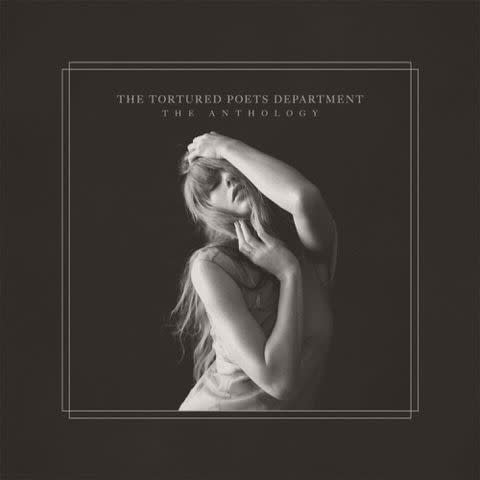
Universal Music Group
Since 2020, Taylor Swift has remained a permanent pop culture fixture by producing three new albums, re-recording four old LPs, embarking on a record-breaking world tour, releasing a concert film, and dating a Super Bowl champion. The masses were nevertheless hungry for more, eagerly awaiting her 11th studio outing after she announced it at the 2024 Grammy Awards. But when the (surprise!) double album arrived in April, Swiftie fatigue finally bore its teeth, with some (albeit, more casual) fans seeing 31 tracks spread over two hours as a steep order. Yet legions of loyalists celebrated having even more music to mine for Easter eggs, not to mention insight into the singer’s highly-publicized relationships.
The Tortured Poets Department is the most overtly thematic entry in her oeuvre, introducing a literary era marked by melodrama and melancholy. Most of the record is fixated on old flames, especially an emotionally unavailable pseudo-intellectual (likely the 1975 frontman Matty Healy), who uses a typewriter and ghosts her after a few weeks. Swift dissects her various entanglements through simple synth-pop compositions and confessional lyrics that range from sentimental (“loml”) to scathing (“The Smallest Man Who Ever Lived”). Meanwhile, ballads like “Clara Bow” and “Peter” help ground the LP in more earnest pathos amid petty swings and forced football metaphors (“The Alchemy,” a rare moment of levity about current beau Travis Kelce). But many tracks are more akin to mundane diary entries than truly poetic meditations.
Tortured Poets is an echo chamber in every sense. On the production side, her heightened vocals seem to float through a hollow tunnel, with isolated piano chords and guitar strums suspended in the air. Then there’s her self-mythologizing, seeing the ever-expanding Taylor Swift Musical Universe (now with latent Kim Kardashian diss tracks) overshadow her tortured poet’s tired soliloquies. Much of the buzz around TTPD glosses over the actual music, because frankly, some content is sonically stale, sounding like the lesser moments of Midnights borrowed the misguided angst of Reputation to meet a tracklist quota. But we shouldn’t undersell the singer because she needed an honest editor. Taylor has proved herself a formidable songwriter countless times, and some new songs belong in her discography’s upper echelon. “But Daddy I Love Him” is a worthy hark back to “Love Story’s” country sensibilities and undeterred affection for a forbidden suitor; “The Black Dog” is an understated, intimate funeral march for a love long gone; and “I Can Do It With a Broken Heart” is a sunny depression anthem that gets your ass out of bed.
If Taylor had parsed Poets down to only its best songs — which are strewn throughout the entire anthology — it would be a satisfying record no longer marred by excess. Instead, she forces us to slow down and weigh its inconsistent scope. That said, it's grown on this writer with each subsequent listen. Maybe we’ll reevaluate it more kindly later on like many did with Reputation, the last LP that notably divided Swifties and critics alike. Until then, TTPD is relegated near the bottom of this list because she ultimately favored quantity over quality.
8. Reputation (2017)
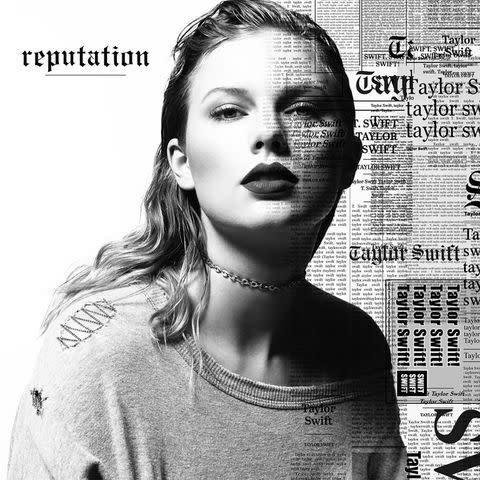
Reputation is, without a doubt, Taylor's most polarizing work to date. After a fiery Twitter storm courtesy of Kanye (though it was far from their first feud), Taylor finally sheds her decade-old, good girl persona for the villain alter-ego curated by the media, opting to settle the score through what she does best: traversing new sonic territory. This time, she trades her upbeat synth-pop for overt trap tremors and heavy-handed hip-hop, like harsh emergency strobes disrupting a blacked-out cityscape. Many listeners at the time of its 2017 release were less than thrilled by what they saw as pseudo-edgy antics, the equivalent of a prep having a bad day and reaching for black lipstick. But, as is tradition, the haters hardly scratched the surface of this sixth record, overlooking its genuine feats of all-encompassing production and high-energy, in-your-face vocals.
The album's opening, "...Ready For It?," is an aptly-titled shockwave to the system compared to her previous work, abandoning instrumental lead-ins for a feel-it-in-your-bones bass machine accelerating into a… rap? And, thus, here's where she lost some audiences at the onset, who understandably furrowed their brows at first listen. But just because Taylor took a sharp left turn doesn't mean she was unsuccessful. Rather, Reputation is often compelling in its lavish catharsis, best seen on tracks "Gorgeous," "King of My Heart," and "Getaway Car" (which has co-writer/producer Jack Antonoff's handprints all over its Bleachers-like chorus builds).
But Reputation is much more than an extended diss track; It's also a not-so-private ceremony for a new, hush-hush love affair (with her now-ex Joe Alwyn). "This ain't for the best / My reputation's never been worse, so / You must like me for me," is a perfect thesis for the album as a whole on "Delicate," one of the LP's highpoints for its light-as-air ambiance, late night whispers coasting on a swirling current of synth waves. And though Taylor's never been a stranger to love songs, here, she's more sultry than sweet. This record at last acknowledges that, yes, a pop star idolized by young girls can also be a sexual being, singing of dirty daydreams and undressing with your eyes (the chorus on "Dress" even blatantly mimics the cadence of a mounting orgasm). But Reputation's best serenade is also its most understated (and underrated): "New Years Day." The album's comedown is a moment of quiet reflection carried by a piano's lone lullaby, when the festivities are over, the partygoers are gone, and all that's left is a lover for the long haul ("I want your midnights / But I'll be cleaning up bottles with you on New Year's Day").
All in all, Reputation is by far Taylor's most misunderstood work — though its criticisms aren't without merit. It's her only album with skip-every-time songs (why on earth would you force a collab between Future and Ed Sheeran?), and is occasionally clumsy in its comebacks. But past skeptics be damned, the album has stood the test of time, with many now backpedaling their initial criticisms to revel in her unabashed outbursts of rage and ecstasy and its thematic anchor of tender love and care. She may be on the outs, but she sure isn't alone.
7. 1989 (Taylor's Version) (2023)
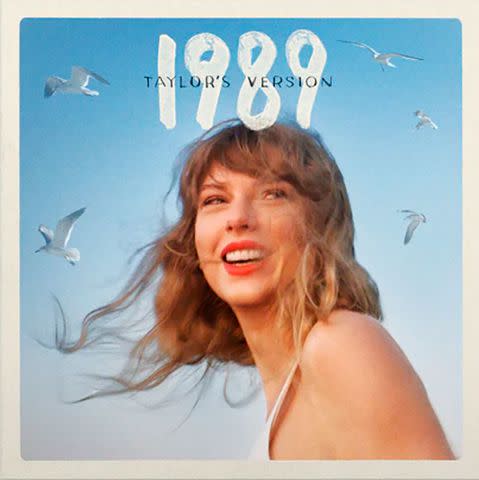
1989 (Taylor's Version) signifies a rebirth of sorts for the singer, not just because it's named after her actual birth year, but because it's a reincarnation of the album that saw her first seismic genre shift. While she had flirted with a transition from country in Red two years prior, 1989 came full throttle in 2014 with heightened production from soon-to-be mainstay producer Jack Antonoff (of Fun. and Bleachers fame). Her 2023 reissue employs that same undercurrent of drums that boom like palms on metal doors and vocals that echo as if off skyscrapers, but this time with a fresh coat of polish.
Taylor's first foray into pop proved her ability to rise above the genre's preoccupation with recycled hooks and surface level lyrics. Like the OG, TS's 1989 is sonically joyous without losing dimension or leaning on familiarity. These are songs that beckon celebration, hands raised over heads in secular worship of a 20-something's innate need to romanticize their life — visions of nice dresses and sunsets, the epicenter of the world awaiting your arrival, hope that your beauty and grace will never fade.
But for every purely excellent song off 1989 ("Out Of The Woods," "Clean") there's invariably a hollow foil track, the worst offenses, of course, being "Shake It Off" and "Bad Blood." Between those extremes is a reliable lineup of ultra-catchy mega-hits that infected the cultural consciousness through Top 40 countdowns and, later, TikTok videos. Songs like "Blank Space" and "Wildest Dreams" are more than deserving of their far-reaching recognizability, but not so much their long time (though presently dethroned) standing at the top of Taylor's Spotify play stats.
What condemns 1989's position at the lower third of this list then is the sad truth that some of the choruses rotating here sound like they could have been parsed out to much lesser 2010s pop stars. Though the album is gorgeously hooky as a whole and perfect for belting in the car for a pick-me-up, it's not hard to imagine Katy Perry or even Demi Lavato as a stand-in singer for the LP's lowest moments. But this is Taylor we're talking about here, and the fact of the matter is, she's at her best at her most singular, when there's zero doubt that anyone but her could have been the creative mind behind the record. So while still an undeniably amazing album, and a true testament to her shape-shifting style, she can and has done better than 1989 — even if the original record was her second go-around for Album of the Year.
6. Fearless (Taylor's Version) (2021)
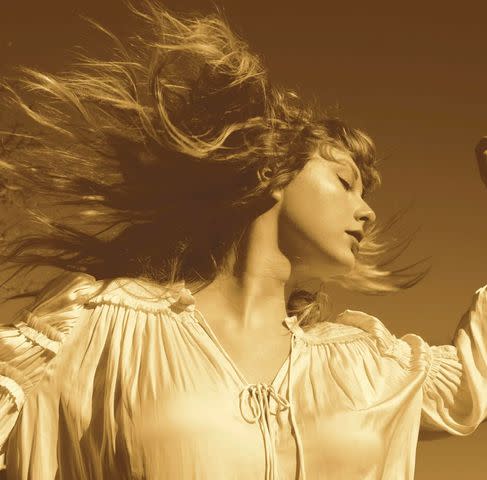
Where her debut guaranteed she was, at the very least, a momentary sensation, it wasn't until 2008's Fearless that the world understood the musical force that Taylor Swift could be. It's the album that immortalized her in the cultural ethos (for the first time around), delivering instant classics in "Love Story" and "You Belong with Me" that are forever fan favorites no matter how far her style and sensibilities have evolved. It made sense then for this, her second studio album, which won her four Grammys including Album of the Year, to be the first altar in the "Taylor's Version" re-recording saga.
"Fearless" might just be the best opening guitar riff of her applicable albums (Taylor Swift, Speak Now, and Evermore's are less so) fringed with a summer's day twang and immediately infecting the listener with a blissful dose of euphoria, like a spoonful of syrup taken between smiling lips. Meanwhile, "Fifteen" translates the same country sentiment into a contemplative portrait of girlhood, of trying to mentor yourself before you've even grown up ("When all you wanted was to be wanted / Wish you could go back and tell yourself what you know now").
But the true gems of this wildly successful 2021 re-recording (which topped every chart in sight across the globe) are undoubtedly "Love Story," which resurfaces here with heightened sensibilities and deeper convictions, along with several songs "From The Vault," most notably "Mr. Perfectly Fine." And we'd be remiss not to highlight the otherwise overlooked single "Today was a Fairytale" that is just as fantastical and hooky as Fearless' trademark tracks, but was unjustly tacked onto the soundtrack for the unfortunate 2010 film Valentine's Day (wherein Taylor made her acting debut as a kissing partner for then-boyfriend Taylor Lautner).
But back to the music. Fearless in its original 2008 form was adolescent in every way: a gentle voice singing fantasies of Juliet finding her Romeo, a boy on a white horse beckoning his hardened princess. Then there's the true-to-life nostalgic musings of romantic naivety at fifteen and unrequited love looming on the high school bleachers. But over a decade later, Taylor makes the incredible move of re-recording her teenaged relics almost note-for-note, now at 31 years old. She draws from her accumulated life experience and musical insight to connect with her younger self, refining her past homages to youth with matured, knowing vocals (dropping her country inflection for a more rounded singsong).
She also notably upgrades the production, as a Professor of Commercial Music explains to EW, with subtle shifts towards a fuller-bodied musical accompaniment (no longer a one-dimensional country backing), re-layering instruments along with slight switch-ups in tempo. This new sound may not be a far cry from the original, but to the trained Swiftie's ear, these small changes culminate into a noticeably "richer" listening experience from all angles.
The resulting 2021 album, Fearless (Taylor's Version), is an inspiring feat and first step forward after reclaiming the masters of her life's work. And, yes, her songwriting here is not quite fully actualized (as hindsight allows us to see now), but that doesn't diminish these songs' lasting splendor. Rather, their relative simplicity only adds to Fearless' charm, bridging the old with the new — a woman's voice singing a girl's anthems — to make a once good album now great.
5. Midnights (2022)
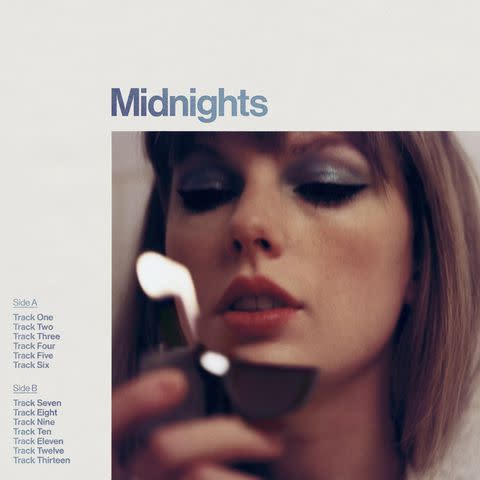
Midnights is simultaneously a rare treat and a return to normalcy. It's Taylor's first autobiographical album in three years, after an incredible pivot to fiction in folklore and evermore followed by re-recording Fearless and Red (with the latter three all dropping in 11 months' time). No one would have blamed her for taking a well-deserved creative hiatus after that marathon of releases, but Taylor has proven herself to be an artist of momentum multiple times over. So, the savant of promotional whimsy announced an upcoming 10th album in August 2022, cloaked her website in a cryptic countdown reading "Meet me at midnight," posted the premise of "the stories of 13 sleepless nights scattered throughout my life," and ceremoniously revealed the track titles from an antique bingo machine in a TikTok series. Expectations were sky high, raising the stakes with them; just how close can Taylor fly to the sun? Midnight's answer: she's still soaring.
It's a dreamy pop album, though not fully aligned with that subgenre thanks to more of Jack Antonoff's signature production, which injects Midnights with a pulsing, mounting aura in hypnotizing new tracks "You're On Your Own, Kid," "Mastermind," and Spotify play count heavyweight champ "Anti-Hero." It's 1989's sonic spirit with more lyrical depth, dipping a brush in her newfound solipsism and painting musical murals of Taylor's "13 sleepless nights," scenes of "self-loathing, fantasizing about revenge, wondering what might have been, falling in love, and falling apart" construed in vivid detail. There are whispers of Reputation as well on opener "Lavender Haze," "Midnight Rain," and b-side "Vigilante Sh-t," which are menacing in their side-eyed electro hip hop shades but with a more relaxed delivery, swapping her sixth album's shock value for more earnest meditations on conflict born out of your own misgivings.
There are many more parallels to past albums, as revisiting life moments already explored in her previous songs creates yet another treasure map of topics for knowledgeable fans. But Midnights — and its seven "3am" bonus tracks — are still steeped in singularity, mostly due to its ultra-honest subject matter and intriguing concept parsed out with Taylor's expert execution. Beyond all the critical and commercial aplomb, it also marked her milestone as the artist with the most Grammy wins for Album of the Year, bringing the total up to four in 2024.
Midnights' careful metaphors are some of the best mirrors for abstract projection and self-reflection that listeners will find on this list. Too many of us have felt like the monster on the hill encroaching on a peaceful city, the devastated partygoer in the blood-soaked gown, the midnight raining on a kindred spirit's sunlight, the lovesick loner lost in a labyrinth of their own making. It's humbling to hear a decades-defining artist at the absolute height of her career sing confessionals about self-loathing ("I'll stare directly at the sun but never in the mirror") and toxic longing ("I hosted parties and starved my body / Like I'd be saved with a perfect kiss") with less inhibition than ever before. It's the stuff of shared languages, not unlike our own pensive journal entries when we had nowhere else to turn but the page. And on Midnights, Taylor turns to us, yet again.
4. Speak Now (Taylor's Version) (2023)
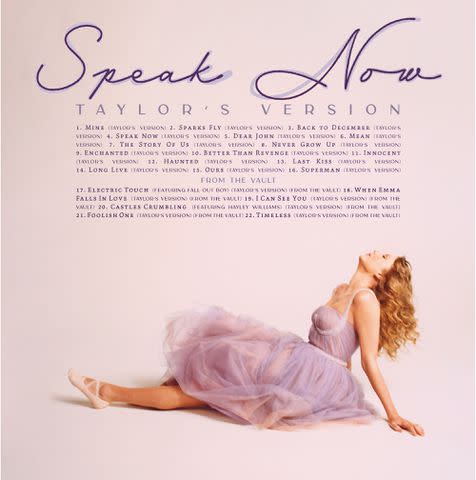
Beth Garrabrant
When you pose the question of why Taylor Swift is among the most distinguished artists in popular music, the strength of her narrative songwriting is among the best answers. And though "All Too Well" is of course her opus in this arena, 2010's Speak Now precedes it with an impressive display of her one-off storytelling powers. Before she had even fully blossomed out of country's genre barriers, Taylor had mastered the delicate balance of detailing life moments blurred between adolescence and adulthood. That early nuance — and the fact that she wrote this entire album on her own — is no small feat, making her re-recording 13 years later feel like a victory lap now that she's finally in full creative control.
"Mine" proves her storytelling strength at the LP's onset, condensing years into seconds, tracing the shadow childhood trauma casts over a guarded, grown-up love ("You made a rebel of a careless man's careful daughter / You are the best thing that's ever been mine"). The rest of the record sees relationships rise and fall like once-great empires reduced to dust, each an individual tragedy set to incessantly hooky choruses. Some stories are symphonic semi-pop anthems ("Enchanted," "Haunted"), while others are country ballads dressed with electric guitars, as seen in "Dear John"'s interrogation of a 32-year-old lover's sway on a still-teen girl ("Don't you think 19's too young to be played by your dark, twisted games?").
Her earlier works' fanciful twang and youthful daydreams still linger on tracks "Speak Now" and "Mean," but where Fearless is purely starry-eyed, Speak Now instead wields a wonderstruck vernacular like a cherished childhood locket and scorches a hole in the heart-shaped photo. Its fantasias are more melancholic, its themes of longing more resentful. Taylor may be wise beyond her years, but that didn't spare her from petty rage, especially on "Better Than Revenge" (which is essentially her "Misery Business"), seeing her scorn another girl for "the things that she does on the mattress" while likening their shared love interest to a toy on the playground in the next breath. Hindsight is 20/20, and now in her 30s, the singer amended the lyrics to eschew some of the women-shaming ("He was a moth to the flame / She was holding the matches").
Herein lies the merit of Speak Now (Taylor's Version). A 20-year-old Taylor, mid-transition from childhood to adulthood, drew from that dizzying dysphoria and used it to refine her already awe-inspired songwriting. Now, over a decade later and in a new stage of life, she builds upon that skill with more empathy, not to mention an added emphasis on production and atmosphere, landing victorious (almost) every time. But her mounting success undoubtedly stands on the shoulders of Speak Now's case studies of condensing complex inner dilemmas — seeing your parents' failed marriage as a prophecy, wishing you'd never grown up — into an album still adorned with hope. She's since genre-jumped from country to proper pop, to electro R&B and bare-backed folk. But what's never changed is Taylor's enchanting ability to translate a memory — whether charmed or trying — into a moment that feels like yours.
3. Evermore (2021)

As if the gift of Folklore's acoustic stylings wasn't a treat enough, Taylor conceived a surprise sister album like clockwork during her end-of-year creative storm, amidst filming the Long Pond Studio Sessions documentary and re-recording Fearless. Another remote collaboration composed in secret, Evermore is a sort of epilogue to the backwoods mythos and backdoor relationships on folklore, delving into new character studies with a familiar, folk-infused air of coulds, woulds, and shoulds. "I loved the ways you welcomed the dreamscapes and tragedies and epic tales of love lost and found into your lives," reads her album announcement. "So I just kept writing them."
What follows is a collection of stone-cold glimpses into the ripple effect discontentment has on relationships: the sadness of a seasonal lover, affection and effort met with indifference, infidelity ending in death. But none are more affecting than "champagne problems," a first-person post-mortem after rejecting a marriage proposal — a classic "it's not you, it's me" scenario — with simple piano chords accompanying the guilt of walking away and the peril of being mentally unwell ("'She would've made such a lovely bride' / 'What a shame she's f–ked in the head,' they said").
These tales spin out like spools of fine gold, delicate in their delivery, eschewing catchy hooks to instead relish in simplicity. However, evermore is still occasionally upbeat with an ethereal glow, with cooing strings that glint on "willow" and synthesizers that gleam on "gold rush." Then there are the hopeful messages embedded in the minor-keys of "marjorie," an homage to her opera-singing grandmother, and "happiness," the chorus of which captures the album's essence best of all: "There'll be happiness after me / But there was happiness because of me."
Like folklore, much of evermore is made up of somber soliloquies that materialize like a fine mist over a field in the dead of winter. But this time, we're also met with a subtle lightness, like the calm and clarity that comes after a good cry. It's a melancholy that allows you to wallow on the condition of looking forward after the fact, holding nothing back as you let everything go.
2. Red (Taylor's Version) (2021)
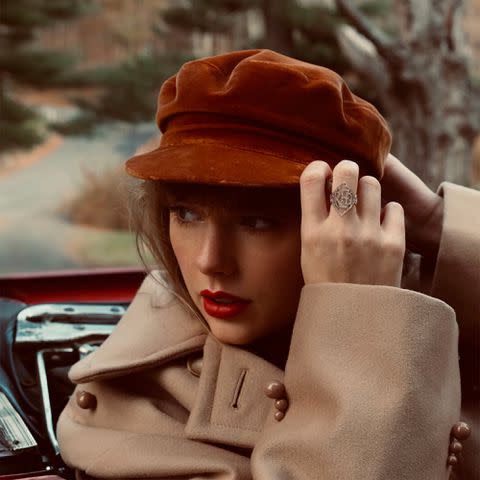
"Musically and lyrically, Red resembled a heartbroken person. It was all over the place, a fractured mosaic of feelings that somehow all fit together in the end. Happy, free, confused, lonely, devastated, euphoric, wild, and tortured by memories past." So reads Taylor Swift's social media announcement that, just two months after gracing fans with her re-recording of Fearless, she was giving the same treatment to 2012's Red — with all 30 songs originally intended for the record.
The finished product is, of course, sterling. Like the "Taylor's Version" before it, 2021's rendition of Red lassos fans' near-decade old affection and nostalgia for the songs and herds them into an encore of adoration. Taylor is again musically faithful to the source material she spawned, honoring her then 22-year-old self by jeering and tearing up right on que, though this time with an inherent air of maturity.
On her first three albums, love is mostly a daydream. But on Red, it's "worthwhile fight" and "a ruthless game," never easy but always intoxicating, almost to the point of nausea. So it is written in "State Of Grace," beginning the album with a percussive prologue á la U2, warning that we "fall in love 'til it hurts or bleeds or fades in time" before proclaiming, almost joyously, that she'll "never be the same." Such contrast in tone and prophecy perfectly capture the beautiful whiplash strewn throughout the album as she walks us through the stages of moving on: willing them to stay ("Treacherous"), drinking with friends to forget ("22"), ending the reconciliation cycle ("We Are Never Ever Getting Back Together"), and starting anew with the next beau ("Begin Again").
But the crowned jewel of the record is obviously the long-waited, 10-minute version of "All Too Well," an expansion on the already sprawling song widely considered by critics and fans alike to be her definitive opus (which, for an artist of Taylor Swift's standing, is absolutely saying something). This time, "All Too Well" retires a full band backing for hazy synths, but it's anything but smoke and mirrors. Rather, it recalls the key moments of a love gone awry in arresting detail — "I'll get older, but your lovers stay my age" — wasting not a single word in confronting a past partner many years her senior (unanimously believed to be Jake Gyllenhaal) nearly 10 years after the fact.
Overall, the beauty of revisiting Red is that many of us, at points high and low, have related to its caustic, dizzying array of emotion, tracing the nonlinear trajectory of falling in love, breaking your heart, and putting it back together again. Taylor herself referred to it as her "only true breakup album," and like her today, whatever heartache made us once cling to Red for the solace is (hopefully) behind us now. Returning to this record then, with its new polish and poise, is a kind of homecoming celebration. What once felt (or possibly still feels) like the end of the world is, on "Taylor's Version," also a testament to resilience — we'll make it to the other side, and we'll do it again and again.
1. Folklore (2020)
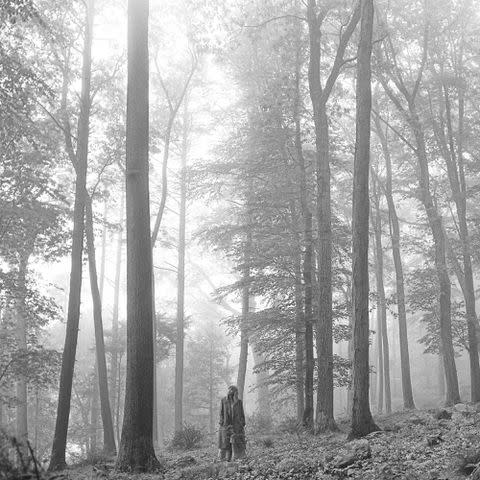
Taylor Swift's Folklore rose from quiet shadows at the peak of isolation and uncertainty, written and produced in quarantine and released during the first COVID summer. Her door to escapism opened for lonesome, fractured listeners everywhere, who dove headfirst into the cottagecore sound grove, and relished in Swift's unexpected pivot towards barer-boned, folk-styled songwriting with electro-adjacent undertones whispered throughout.
The music of folklore takes its time to unfurl, ivory keys yawning at dusk, acoustic strings waking at daybreak. Her detour is immediately apparent with a simple piano opening on "the 1," as piano chords echo a slight reverb off a guitar's strum-claps, while melancholy ballad "exile" (feat. Justin Vernon of Bon Iver's defeated drawl) borrows similarly spacious minor keys with ten times the heartbreak. In fact, most every song is stripped to a softer core than we've ever heard from Taylor before, with the exception of some past anomalies (re: Reputation's "New Years Day"). folklore in comparison merely flirts along the edges of pop mantras on songs like "the last great american dynasty" and the deeply affecting "mirrorball," while veering straight into indie-folk influence on "illicit affairs" and the finger-plucked "invisible string," among others.
Still, what some may see as folklore's central weakness is in actuality its greatest strength. Her eighth LP disregards the crutch of compelling production and relies more so on solemn, thoughtful writing — and is her first full-length departure from autobiography into fiction. It's the product of a prolific mind being forced to slow down, reflect, and create something completely new; A memoirist moved to experiment with a stream-of-consciousness novel. The record's tales unfold into imagined personal histories, with what Swift calls the "Teenage Love Triangle" songs (suspected to be "Cardigan," "August," and "Betty") painting three vivid portraits of an interwoven affair at different points in time.
But folklore is more a shuffled series of vignettes than a throughlined story, planting the lyrics with easter eggs — recurring motifs (a favorite cardigan), places (cobblestone paths), and events (pulling up in a car, professing love on the porch) — to offer conflicting perspectives of a love long ago lost. These subtle parallels between songs form a sheen narrative web that hovers above the awareness of the average listener but dazzles the die-hard fan, who at this point is well accustomed to Swift's scavenger hunt antics. But none before were so intricate and immersive as a whole fictional timeline pieced together from multiple angles in an album just over an hour long.
Listening to folklore then is like wiping the cuff of a cable knit on fogged glass to peer in on private moments. Yet between its plot-point breadcrumbs is an inherent relatability embedded in Taylor's never-better introspection. It's as if we're sitting round a campfire confiding in one another, sharing painful memories of when our best wasn't good enough, when our savior complex sputtered out, and when we watched them walk away. folklore is a backward glance over your shoulder clouded by a cold air exhale — and it remains Taylor's greatest work to date.
Related content:
All the proof Taylor Swift is making first major change to Eras Tour
Here’s every Taylor Swift movie and documentary in chronological order
Read the original article on Entertainment Weekly.

